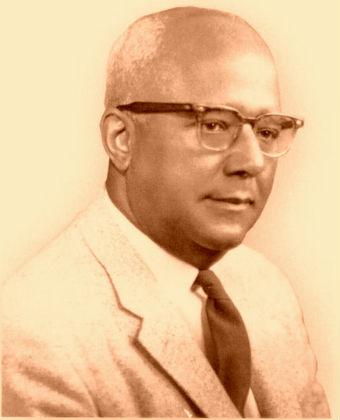
William Leo Hansberry, historian of Africa at Howard University, died on November 3, 1965. Despite Hansberry’s being one of the most well-respected professors at Howard by students and faculty alike, his work and impact have gone largely unrecognized.
Hansberry was born on February 25, 1894, in Mississippi to Elden and Pauline Hansberry. His father, who taught history at Alcorn A&M College, died when Hansberry was just three years old, so Hansberry was raised by his mother and his stepfather, Elijah Washington. Following in Elden’s footsteps, Hansberry studied history at Atlanta University before finishing his undergraduate degree at Harvard University in 1921. He began teaching at Howard University in Washington, DC, in 1922, where his lessons on African history had an indelible impact on many of his students.
Hansberry taught some of the first courses in the United States on African history and is cited by his former students as having inspired them to appreciate and further study the subject. Hansberry taught not one but two future presidents of African countries. Nnamdi Azikiwe, Nigeria’s first elected president, noted that Hansberry “opened a new world to [Africans] in medieval history, pinpointing the role of Ghana, Melle, and Songhay in the history of Africa.” After Hansberry’s death, in The Crisis, Azikiwe credited Hansberry with creating his interest in the “research in African history and culture.” Despite attending Lincoln University in Pennsylvania, Kwame Nkrumah, Ghana’s first elected president, allegedly found time to travel to DC to sit in on Hansberry’s lectures. It has been reported that many other African students referred to him as “father . . . as a mark of respect.”
What made Hansberry so well liked? He was the first American professor to accurately tell the rich history of Africa and point out the many advanced civilizations it had. By analyzing ancient Greek and Roman accounts of Africa, his research demonstrated the robust wealth and grandeur of the African continent and the people who inhabited it, especially in Egypt and Ethiopia. In a time where most historical scholarship dismissed Africa as the “dark continent,” Hansberry’s scholarship and lectures shed light on the importance of African history. Hansberry was also one of the first historians to challenge notions of the “white man’s burden” and argued that progress of African civilizations was not saved by European intervention but instead hindered by it. As other historians labeled Africa as a hopeless continent for its role in the slave trade, Hansberry’s histories and classes spoke to the prosperity of African history prior to the arrival of European slave traders and how that prosperity was interrupted by these very slave traders.
Unfortunately, Hansberry died before publishing his work. Although Hansberry completed his master’s degree in 1932 at Harvard, he never earned a doctorate. Even though he studied with a Fulbright scholarship at the University of Oxford, Cairo University, and the University of Chicago, his dissertation was never completed—not for lack of trying but because Hansberry became an expert in his area of research before experts in his field existed. According to Hansberry’s mentor, Harvard professor Earnest A. Hooton, “he made himself the most competent authority upon his subject” and therefore “was unable to take his PhD degree classes because no school had faculty members qualified to supervise his thesis.” His works were only published posthumously after Joseph E. Harris, former chair of the Howard history department, edited and compiled his findings into two scholarly volumes.
Recently, a group of scholars have come to give credit to Hansberry by naming their organization after him. The William Leo Hansberry Society formed in the summer of 2020 with a mission aligned with Hansberry’s work: to promote, research, and diversify the study of ancient Africa and Africans. The organization includes a collection of scholars from different disciplines, including Egyptologists and Africanists who study the ancient history, language, and culture of Northeast Africa.
This society begins the work of recognizing Hansberry’s importance not just as a trailblazing scholar in African history but as one of the most impactful history educators produced in the United States. As historians, we are more than the histories we write and do or do not publish. More important is the impact our lives, research, and history have on our students and readers. Hansberry’s life, research, and impact deserve special praise and recognition.
Mark Lewin
Mount Saint Mary College
Tags: In Memoriam Long Overdue Africa

This work is licensed under a Creative Commons Attribution-NonCommercial-NoDerivatives 4.0 International License. Attribution must provide author name, article title, Perspectives on History, date of publication, and a link to this page. This license applies only to the article, not to text or images used here by permission.
The American Historical Association welcomes comments in the discussion area below, at AHA Communities, and in letters to the editor. Please read our commenting and letters policy before submitting.
Comment
Please read our commenting and letters policy before submitting.






